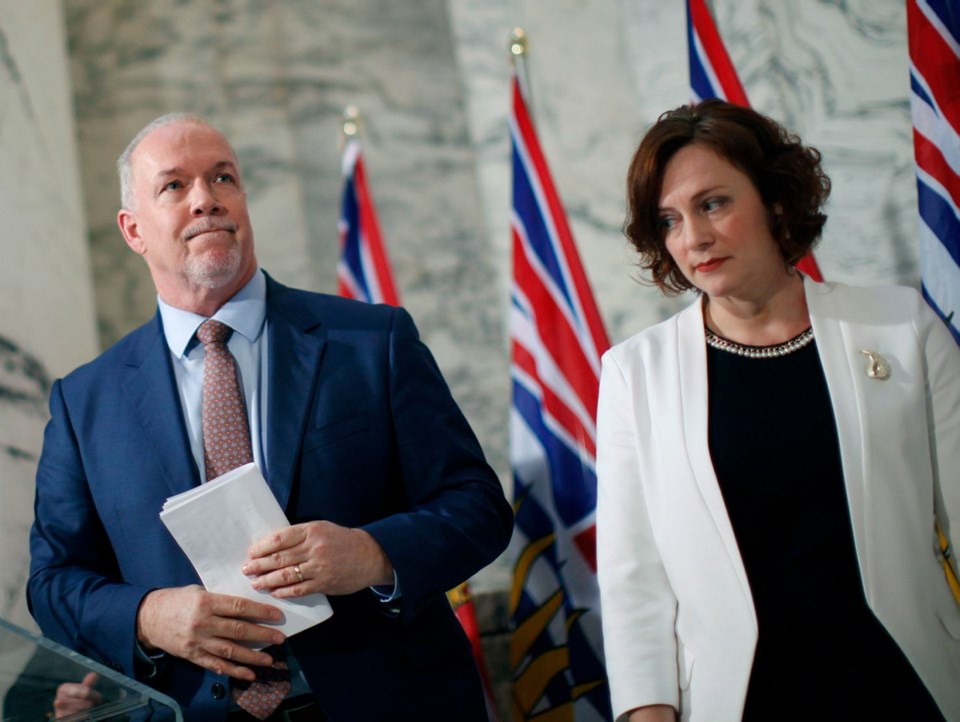 Regrettably, the B.C. Utilities Commission had to reset the numbers last week on the “13 Days Without Government Meddling” sign out front.
Regrettably, the B.C. Utilities Commission had to reset the numbers last week on the “13 Days Without Government Meddling” sign out front.
That’s a shame. They got off to such a promising start. It looked as if it was going to stretch for weeks, or even months.
It was only three weeks ago that Energy Minister Michelle Mungall released a couple of reviews of all the previous government’s horrible interventions in B.C. Hydro affairs and promised a new day of independent oversight by the BCUC.
No more government interference. Or at least, not as much.
Her key message was that the NDP government was going to hold Hydro bills to an eight per cent increase over five years, partly by staying hands-off.
“BCUC oversight is more appropriate than government oversight to ensure ratepayers’ interests are best protected,” was the theme.
So legislation and regulations are coming to roll back B.C. Liberal directions that restricted the utilities commission’s oversight of B.C. Hydro.
To be fair, there was an asterisk accompanying the solemn vow. In order to minimize the ongoing cost of B.C. Liberal decisions, “government anticipates that, on occasion, it will be required to provide direction to the BCUC to guide decision-making in proceedings that have implications for government policy.”
That’s more or less the same loophole the Liberals used with abandon over the years.
Mungall’s announcement said that NDP policy guidance could be conveyed by having the government intervene in hearings, or by providing a letter of comment, or by issuing directions.
But to respect the independence of the commission, “government will limit the use of these directives as much as possible.”
They managed to hold off 13 days before wiggling through the escape clause.
It happened at a commission hearing Feb. 27 into the regulation of electric-vehicle charging services. Those are going to multiply over the next several years as the government embarks on a huge program to nudge people out of gas vehicles and into electric ones.
The BCUC has been examining all the implications and was starting the second phase of hearings. Things took an unexpected turn when a government lawyer representing the Ministry of Energy essentially told them they don’t have to worry about one key issue because the government has already made up its mind.
“The province very much appreciates the panel’s efforts … to fully examine questions relating to the role of public utilities such as B.C. Hydro and FortisBC in delivering EV charging services.
“However … the province has already reached conclusions relating to that role.”
She told the panel that if it intends to make recommendations to government, “there would be little value in recommendations regarding the appropriate role of public utilities in delivering EV charging services, or in recommendations relating to cost recovery, since the province has already reached conclusions on those matters.”
The whole broad topic of whether to let the utilities into the EV charging field, which had nine areas of inquiry, was suddenly off limits.
“Since the province has already reached conclusions of its own … any recommendations from the panel pertaining to those questions would be of little use.”
Not only that, but any further process could delay the inquiry, and the province wants to move quickly on getting utilities into the charging scene.
The policy itself isn’t exactly a bombshell. Many expected the utilities would be dealt in. But the panel appeared taken aback at being told by the government there was no need for final arguments on the issue.
The chairperson asked the lawyer if she “could direct us to where that policy has been articulated?”
The answer was basically: “I just did.”
The Energy Ministry is open to hearing details from the BCUC on how to design this new landscape. Those would include how private companies can compete with utilities that can recoup any losses from their ratepayers. But the basic picture is already drawn. By decree.
The chair noted a lot of people in the room were struggling to understand how the government submissions fit into a policy framework.
So things are pretty much back to normal.



